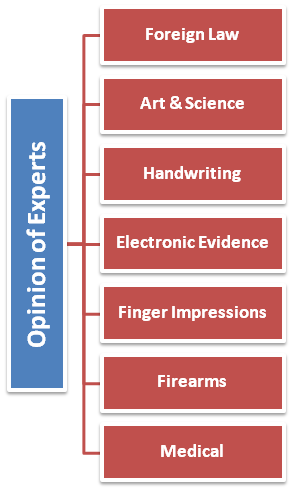Section – 45 to 51 of Evidence Act
OPINIONS OF THIRD PERSONS WHEN RELEVANT
It is the general rule that the opinions of a third person or party are irrelevant. However, there are some instances/exceptions when the opinion of the third person is taken into consideration. This falls under Section 45 to 51 of the Indian Evidence Act
The term ‘opinion’ means something more than mere relating of gossip or of hearsay. It means judgment or belief, that is a belief or conviction resulting from what one thinks on a particular question.
There are cases in which the court is not in a position to form a correct opinion (e.g. when the question involved is beyond the range of common experience or common knowledge), without the help of persons who have acquired special skill or experience in a particular subject. In these cases, the rule is relaxed, and expert evidence is admitted to enable the court to come to a proper decision.
Section – 45 to 51 of Evidence Act
Who is An Expert?
The definition of an expert may be referred from the provision of Sec.45 of Indian Evidence Act that an ‘Expert’ means a person who has special knowledge, skill or experience in any of the following—-

- Foreign law,
- Science
- Art
- Handwriting or
- Finger impression
and such knowledge has been gathered by him—
- by practice,
- observation or
- proper studies.
For example, medical officer, chemical analyst, explosive expert, ballistic expert, fingerprint expert etc.
Section – 45 to 51 of Evidence Act
OPINIONS OF THIRD PERSONS WHEN RELEVANT
Duty of the expert:-
- An expert is not a witness of fact.
- His evidence is of advisory character.
- An expert deposes and does not decide.
- An expert witness is to furnish the judge necessary scientific criteria for testing the accuracy of the conclusion so as to enable the judge to form his independent judgment by application of the criteria to the facts proved by the evidence
Section – 45 to 51 of Evidence Act
Evidentiary Value of Expert Evidence
The Evidence Act only provides about the relevancy of expert opinion but gives no guidance as to its value. The opinion of an expert should be supported by the facts and circumstances of the cases, contradiction due to other evidence or fallacies in the findings of the expert render the evidence inadmissible and unreliable. An expert’s opinion is not binding upon the court. Further the opinion of an expert cannot supersede evidence of an attesting witness.
The value of expert opinion suffers from various drawbacks’. There is the danger of error or deliberate falsehood. “These privileged persons might be half blind, incompetent or even corrupt.” It would be highly unsafe to convict a person on the sole testimony of an expert. Therefore, a conviction cannot be based solely on the opinion of an expert without substantial corroboration.
S. Gopal Reddy v. State of A.P, AIR 1996 SC 2184
In this case the court observed that expert evidence are just a mere opinion and not the substantive or a probative evidence; according to the procedural rule the opinion or the inference of the expert is not safe as they don’t have any independent value so they must be corroborated with the circumstantial evidence.
When there is a conflict between the medical evidence and ocular evidence, oral evidence of an eye witness has to get primacy as medical evidence is basically opinionative. Where the direct evidence is not supported by the expert evidence, the evidence is wanting in the most material part of the prosecution case and therefore, it would be difficult to convict the accused on the basis of such evidence. If the evidence of the prosecution witnesses is totally inconsistent with medical evidence, it is the most fundamental defect in the prosecution case and unless this inconsistency is reasonably explained, it is sufficient to discredit the evidence as well as the entire case. Mani Ram v. State of U.P.
Section – 45 to 51 of Evidence Act
OPINIONS OF THIRD PERSONS WHEN RELEVANT
Foreign law- As the judges of our nation would not be having much knowledge about foreign laws, so the opinions of experts are taken into account. In Aziz Bano v. Mohamad Ibrahim Hussain[1], the Allahabad High Court observed that the Shia law cannot be called a foreign law as it is one of the laws of India on marriage so the court has to interpret the law of land and apply the same in the case in question.
Medical opinion:-
The value of Medical evidence is only corroborative. A doctor acquires special knowledge of medicine and surgery and as such he is an expert. Opinions of a medical officer, physician or surgeon may be admitted in evidence to show–
- Physical condition of the a person,
- Age of a person
- Cause of death of a person
- Nature and effect of the disease or injuries on body or mind
- Manner or instrument by which such injuries was caused
- Time at which the injury or wounds have been caused.
- Whether the injury or wounds are fatal in nature
- Cause, symptoms and peculiarities of the disease and whether it is likely to cause death
- Probable future consequences of an injury etc.
Handwriting Expert
The opinion of a handwriting expert is admissible under Section 45 of the act, however it is not binding. The evidence of handwriting cannot be considered a conclusive proof.
In the case of State of Maharashtra v. Sukhdev Singh 1992, the court has laid down the principles of judging opinion of handwriting expert, namely;
- The identification done through handwriting does not share the same merit as identification done through finger prints. In comparison more weight is given to finger prints as opposed to handwriting.
- Corroboration is required as handwriting is evidence is a weak form of evidence and cannot be relied upon solely.
- The genuineness of the specimen handwriting as that of the suspect must be established.
- Expert’s competence, reliability and ability needs to be established before the Court.
- The reason for the expert’s findings and opinion should be based on a scientific principle and should be convincing in nature.
- The Court should be caution in basing its judgment on the opinion of the expert.
The following are the different modes of proving handwriting:-
- A person who wrote the document can prove it. (Sec.47)
- A person who saw someone writing or signing a document can prove it (Sec.47)
- A person who is acquainted with the handwriting by receiving the documents purported to have been written by the party in reply to his communication or in ordinary course of business, can prove the documents (Sec.47)
- The court can form opinion by comparing disputed handwriting with the admitted handwriting. (Sec.73)
- The person against whom the document is tendered can admit the handwriting. (Sec.21)
- The expert can compare disputed handwriting with admitted handwriting and thereby prove or disprove whether the documents were written by the same or different persons. (Sec.45)
Evidence of tracking dogs:-
Trained dogs are used for detection of crime. The trainer of tracking dogs can give evidence about the behavior of the dog. The evidence of the tracker dog is also relevant U/s-45.
In Abdul Razak V. State of Maharashtra (AIR 1970 SC 283) question arises before the Supreme Court whether the evidence of dog tracking is admissible in evidence and if so, whether this evidence will be treated at par with the evidence of scientific expert
Section – 47 of Evidence Act
Opinion as to handwriting, when relevant
Fakhruddin vs State of MP, 1967 SC
Supreme Court held that handwriting may be proved by the evidence of a witness in whose presence the writing was done, and this would be direct evidence, and if it is available, then any other kind of evidence is rendered unnecessary.
Note:Under section 73court will compare handwriting to be proved with handwriting already admitted or proved.
Opinion as to Digital Signature when Relevant
Section 47-A of the Indian Evidence Act, 1872 speaks about, “Opinion as to digital signature when relevant”. Section 47-A says that when the question before the court is about the authenticity of electronic evidence of any person then the opinion of the certifying authority who issued the electronic certificate will be relevant.








No comment